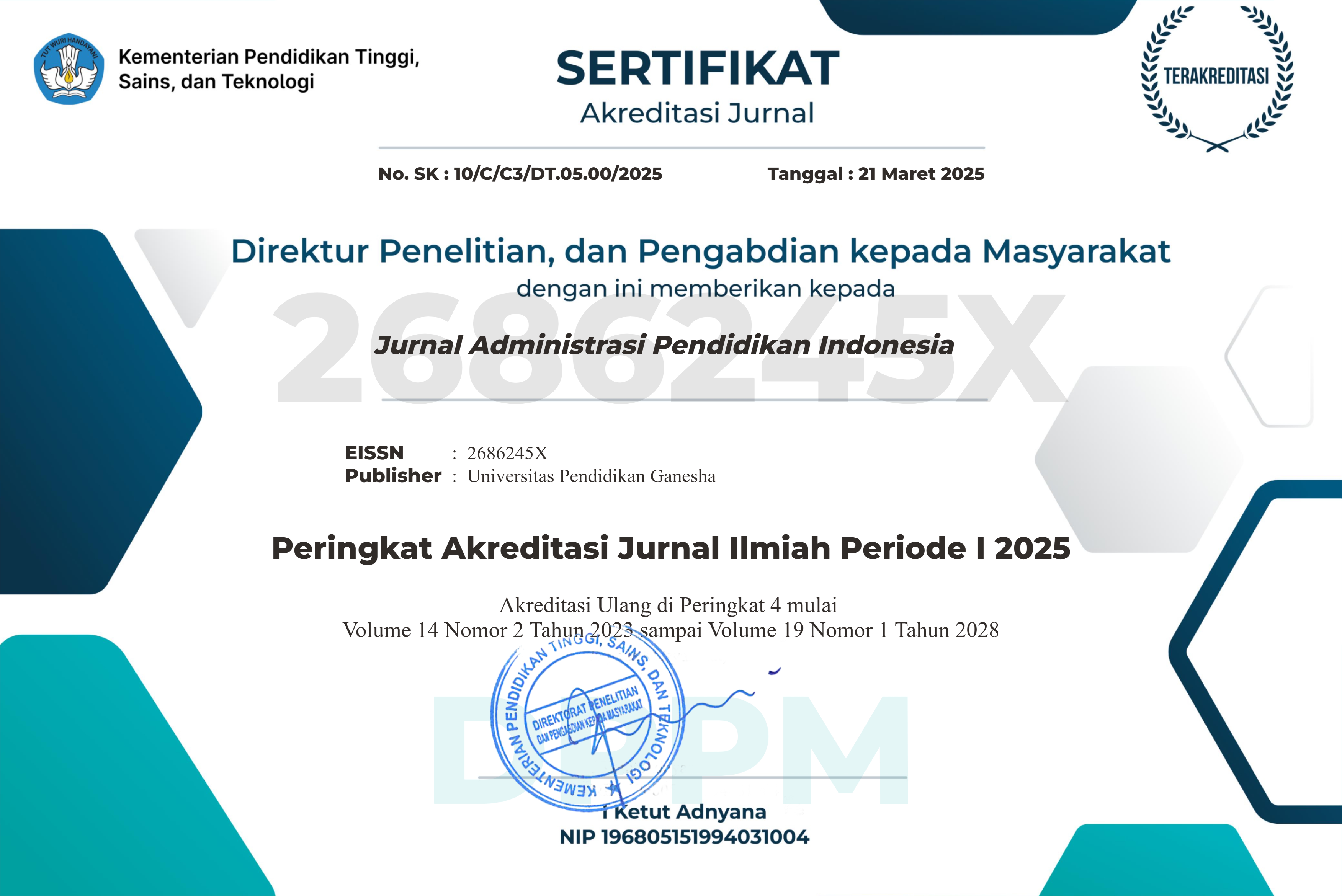Relationship of Remuneration, Work Motivation, Work Discipline and Job Satisfaction to Employee Performance
DOI:
https://doi.org/10.23887/jurnal_ap.v12i1.466Keywords:
remuneration, work motivation, work discipline, job satisfaction, employee performanceAbstract
The present study aimed at determining the relationship between remuneration, work motivation, work discipline, and job satisfaction on employee performance at the Bureau of Academic, Cooperation, Planning and Student Affairs at Ganesha University of Education (UNDIKSHA). This study was an ex post-facto study. In this study, the samples were taken from the total employees of 30 employees at the Bureau of the UNDIKSHA. The study had two variables; the independent variables, namely remuneration (X1), work motivation (X2), work discipline (X3), and job satisfaction (X4) and the dependent variable, namely employee performance (Y). In this study, questionnaire was used to collect the data and multiple regression and partial correlation were used to analyze the data. The results showed 1) A significant relationship between remuneration and employee performance at the Bureau of Academic, Cooperation, Planning, Undiksha Student Affairs was found. With a relationship of 63.3% and an effective contribution of 15.55%, 2) A significant relationship was found between Work Motivation and Employee Performance at the Bureau of Academic, Cooperation, Planning, Undiksha Student Affairs. With a relationship of 71.3% and an effective contribution of 24.17%, 3) A significant relationship between Work Discipline and Employee Performance in the Academic, Cooperation, Planning, Student Affairs Bureau of Undiksha. With a relationship of 60.3% and an effective contribution of 19.48, 4) A significant relationship between Job Satisfaction and Employee Performance at the Bureau of Academic, Cooperation, Planning, Undiksha Student Affairs. With a relationship of 77.5% and an effective contribution of 30.01, and 5) A significant relationship among Remuneration, Work Motivation, Work Discipline, and Job Satisfaction with Employee Performance at the Bureau of Academic, Cooperation, Planning, Student Affairs. Undiksha, with a relationship of 89.2%.
References
Gorda, I Gusti Ngurah. 2005. Manajemen Sumber Daya Manusia. Cetakan Kedua. Denpasar: Astabarata Bali.
Lantara, I Wayan Arya. 2018. Pengaruh Motivasi Kerja Terhadap Kinerja Karyawan Dengan Kepuasan Kerja Sebagai Variabel Intervening di PT. Indonesia Tourism Development Corporation (ITDC). Jurnal Pendidikan Ekonomi Undiksha Volume 10 Nomor 1.
Mangkuprawira, Sjafri.2007. Manajemen Mutu Sumber Daya Manusia. (cet. 1; Bogor: Ghalia
Meilinda, Hera, dkk. 2019. Pengaruh Remunerasi Dan Budaya Kerja Terhadap Kinerja Pegawai (Suatu Studi Pada Balai Besar Wilayah Sungai Citanduy Banjar). Busines Management and Entrepreneurship Journal Volume 1 Nomor 3.
Pora, Antonio De. 2011. Remunerasi, Kompensasi dan Benefit. Jakarta: Rana. Pustaka.
Sunyoto, Danang. 2012. Dasar-dasar Manajemen Pemasaran. Cetakan Pertama. Yogyakarta: CAPS.
Teja, Sri Gusti Bima Harya. 2017. Pengaruh Remunerasi Dan Motivasi Kerja Terhadap Kinerja Karyawan (Studi Kasus Pada Kantor Pengawasan Dan Pelayanan Bea Dan Cukai Surakarta). Jurnal Ekonomi Manajemen Sumber Daya Vol. 19, No. 2.
Widodo. 2010. Managemen Kinerja. Jakarta: Rajawali Pers.
Wijania, I Wayan. 2017. Kontribusi Kepemimpinan Pelayan Kepala Sekolah, Motivasi Kerja Dan Disiplin Kerja Terhadap Kinerja Guru. Jurnal Ilmiah Pendidikan dan Pembelajaran Volume 1 Nomor 3.
Yanthi, Putu berliana Olivia Nirmala, dkk. 2019. Pengaruh Disiplin Kerja Dan Motivasi Terhadap Kinerja Karyawan Pada PT. XL Axiata Cabang Singaraja. Bisma: Jurnal Manajemen, Vol. 5 No. 2, Oktober 2019 P-ISSN: 2476-8782.











